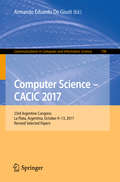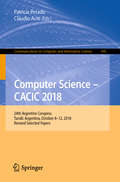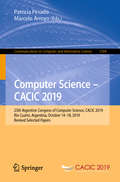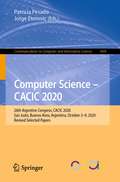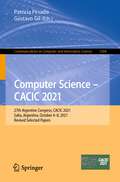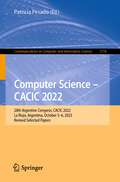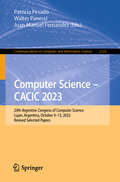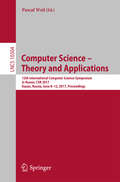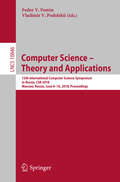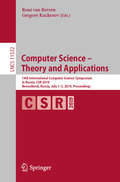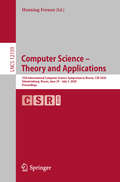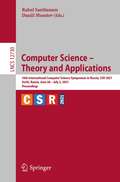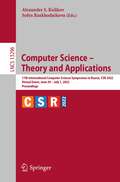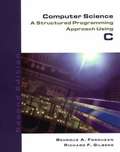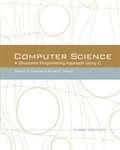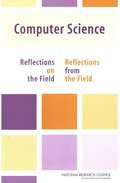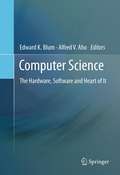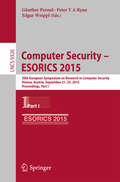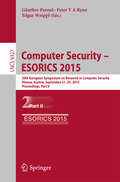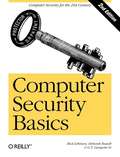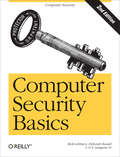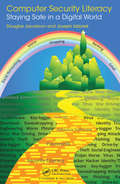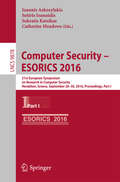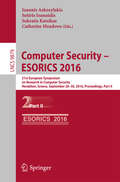- Table View
- List View
Computer Science – CACIC 2017: 23rd Argentine Congress, La Plata, Argentina, October 9-13, 2017, Revised Selected Papers (Communications in Computer and Information Science #790)
by Armando Eduardo De GiustiThis book constitutes revised selected papers from the 23rd Argentina Congress on Computer Science, CACIC 2017, held in La Plata, Argentina, in October 2017. The 28 papers presented in this volume were carefully reviewed and selected from a total of 132 submissions. They were organized in topical sections named: intelligent agents and systems; distributed and parallel processing; computer technology applied education; graphic computation, images and visualization; software engineering; databases and data mining; hardware architectures, networks and operating systems; innovation in software systems; signal processing and real-time systems; computer security; and innovation in computer science education.
Computer Science – CACIC 2018: 24th Argentine Congress, Tandil, Argentina, October 8–12, 2018, Revised Selected Papers (Communications in Computer and Information Science #995)
by Patricia Pesado Claudio AcitiThis book constitutes revised selected papers from the 24th Argentine Congress on Computer Science, CACIC 2018, held in Tandil, Argentina, in October 2018. The 26 papers presented in this volume were carefully reviewed and selected from a total of 155 submissions. They were organized in topical sections named: Agents and Systems; Distributed and Parallel Processing; Technology Applied to Education; Graphic Computation, Images and Visualization; Software Engineering; Databases and Data Mining; Hardware Architectures, Networks, and Operating Systems; Innovation in Software Systems; Signal Processing and Real-Time Systems; Computer Security; Innovation in Computer Science Education; and Digital Governance and Smart Cities.
Computer Science – CACIC 2019: 25th Argentine Congress of Computer Science, CACIC 2019, Río Cuarto, Argentina, October 14–18, 2019, Revised Selected Papers (Communications in Computer and Information Science #1184)
by Patricia Pesado Marcelo ArroyoThis book constitutes revised selected papers from the 25th Argentine Congress on Computer Science, CACIC 2019, held in Río Cuarto, Argentina, in October 2019.The 27 full papers presented in this volume were carefully reviewed and selected from a total of 185 submissions. They were organized in topical sections named: intelligent agents and systems; distributed and parallel processing; computer technology applied to education; graphic computation, images and visualization; software engineering; databases and data mining; hardware architectures, networks, and operating systems; innovation in software systems; signal processing and real-time systems; computer security; innovation in computer science education; and digital governance and smart cities.
Computer Science – CACIC 2020: 26th Argentine Congress, CACIC 2020, San Justo, Buenos Aires, Argentina, October 5–9, 2020, Revised Selected Papers (Communications in Computer and Information Science #1409)
by Patricia Pesado Jorge EterovicThis book constitutes revised selected papers from the 26th Argentine Congress on Computer Science, CACIC 2020, held in San Justo, Buenos Aires, Argentina in October 2020. Due to the COVID-19 pandemic the conference was held in a virtual mode. The 21 full papers and 3 short papers presented in this volume were carefully reviewed and selected from a total of 118 submissions. They were organized in topical sections named: intelligent agents and systems; distributed and parallel processing; computer technology applied to education; graphic computation, images and visualization; software engineering; databases and data mining; hardware architectures, networks, and operating systems; innovation in software systems; signal processing and real-time systems; innovation in computer science education; computer security; and digital governance and smart cities.
Computer Science – CACIC 2021: 27th Argentine Congress, CACIC 2021, Salta, Argentina, October 4–8, 2021, Revised Selected Papers (Communications in Computer and Information Science #1584)
by Patricia Pesado Gustavo GilThis book constitutes revised selected papers from the 27th Argentine Congress on Computer Science, CACIC 2021, held in Salta, Argentina in October 2021. Due to the COVID-19 pandemic the conference was held in a virtual mode. The 18 full papers and 3 short papers presented in this volume were carefully reviewed and selected from a total of 130 submissions. They were organized in topical sections named: intelligent agents and systems; distributed and parallel processing; computer technology applied to education; graphic computation, images and visualization; software engineering; databases and data mining; hardware architectures, networks, and operating systems; innovation in software systems; signal processing and real-time systems; computer security; and digital governance and smart cities.
Computer Science – CACIC 2022: 28th Argentine Congress, CACIC 2022, La Rioja, Argentina, October 3–6, 2022, Revised Selected Papers (Communications in Computer and Information Science #1778)
by Patricia PesadoThis book constitutes the refereed proceedings of the 28th Argentine Congress on Computer Science, CACIC 2022, held in La Rioja, Argentina, during October 3–6, 2022. The 20 full papers included in this book were carefully reviewed and selected from 184 submissions. They were organized in topical sections as follows: Agents and Systems; Technology Applied to Education; Graphic Computation, Images and Visualization; Software Engineering; Databases and Data Mining; Hardware Architectures, Networks, and Operating Systems; Innovation in Software Systems; Signal Processing and Real-Time Systems; Innovation in Computer Science Education; and Digital Goverance and Smart Cities.
Computer Science – CACIC 2023: 29th Argentine Congress of Computer Science, Lujan, Argentina, October 9–12, 2023, Revised Selected Papers (Communications in Computer and Information Science #2123)
by Juan Manuel Fernández Patricia Pesado Walter PanessiThis book constitutes the refereed proceedings of the 29th Argentine Congress of Computer Science on Computer Science - CACIC 2023, held in Luján, Argentina, during October 9–12, 2023. The 27 full papers included in this book were carefully reviewed and selected from 142 submissions. They were organized in topical sections as follows: agents and systems; distributed and parallel processing; technology applied to education; graphic computation, images and visualization; software engineering; databases and data mining; hardware architectures, networks, and operating systems; innovation in software systems; signal processing and real-time systems; innovation in computer science education; computer security; digital governance and smart cities.
Computer Science – Theory and Applications: 12th International Computer Science Symposium in Russia, CSR 2017, Kazan, Russia, June 8-12, 2017, Proceedings (Lecture Notes in Computer Science #10304)
by Pascal WeilThis book constitutes the proceedings of the 12th International Computer Science Symposium in Russia, CSR 2017, held in Kazan, Russia, in June 2017. The 22 full papers presented in this volume were carefully reviewed and selected from 44 submissions. In addition the book contains 6 invited lectures. The scope of the proposed topics is quite broad and covers a wide range of areas such as: include, but are not limited to: algorithms and data structures; combinatorial optimization; constraint solving; computational complexity; cryptography; combinatorics in computer science; formal languages and automata; algorithms for concurrent and distributed systems, networks; applications of logic to computer science, e.g. proof theory, model checking and verification; formal and algorithmic aspects of bio-informatics; current challenges such as quantum computing.
Computer Science – Theory and Applications: 13th International Computer Science Symposium in Russia, CSR 2018, Moscow, Russia, June 6–10, 2018, Proceedings (Lecture Notes in Computer Science #10846)
by Fedor V. Fomin Vladimir V. PodolskiiThis book constitutes the proceedings of the 13th International Computer Science Symposium in Russia, CSR 2018, held in Moscow, Russia, in May 2018.The 24 full papers presented together with 7 invited lectures were carefully reviewed and selected from 42 submissions. The papers cover a wide range of topics such as algorithms and data structures; combinatorial optimization; constraint solving; computational complexity; cryptography; combinatorics in computer science; formal languages and automata; algorithms for concurrent and distributed systems; networks; and proof theory and applications of logic to computer science.
Computer Science – Theory and Applications: 14th International Computer Science Symposium in Russia, CSR 2019, Novosibirsk, Russia, July 1–5, 2019, Proceedings (Lecture Notes in Computer Science #11532)
by René Van Bevern Gregory KucherovThis book constitutes the proceedings of the 14th International Computer Science Symposium in Russia, CSR 2019, held in Novosibirsk, Russia, in July 2019. The 31 full papers were carefully reviewed and selected from 71 submissions. The papers cover a wide range of topics such as algorithms and data structures; computational complexity; randomness in computing; approximation algorithms; combinatorial optimization; constraint satisfaction; computational geometry; formal languages and automata; codes and cryptography; combinatorics in computer science; applications of logic to computer science; proof complexity; fundamentals of machine learning; and theoretical aspects of big data.
Computer Science – Theory and Applications: 15th International Computer Science Symposium in Russia, CSR 2020, Yekaterinburg, Russia, June 29 – July 3, 2020, Proceedings (Lecture Notes in Computer Science #12159)
by Henning FernauThis book constitutes the proceedings of the 15th International Computer Science Symposium in Russia, CSR 2020, held in Yekaterinburg, Russia, in June 2020. The 25 full papers and 6 invited papers were carefully reviewed and selected from 49 submissions. The papers cover a broad range of topics, such as: algorithms and data structures; computational complexity, including hardness of approximation and parameterized complexity; randomness in computing, approximation algorithms, fixed-parameter algorithms; combinatorial optimization, constraint satisfaction, operations research; computational geometry; string algorithms; formal languages and automata, including applications to computational linguistics; codes and cryptography; combinatorics in computer science; computational biology; applications of logic to computer science, proof complexity; database theory; distributed computing; fundamentals of machine learning, including learning theory, grammatical inference and neural computing; computational social choice; quantum computing and quantum cryptography; theoretical aspects of big data. The conference was cancelled as a live conference due to the corona pandemic.
Computer Science – Theory and Applications: 16th International Computer Science Symposium in Russia, CSR 2021, Sochi, Russia, June 28–July 2, 2021, Proceedings (Lecture Notes in Computer Science #12730)
by Rahul Santhanam Daniil MusatovThis book constitutes the proceedings of the 16th International Computer Science Symposium in Russia, CSR 2021, held in Sochi, Russia, in June/July 2021. The 28 full papers were carefully reviewed and selected from 68 submissions. The papers cover a broad range of topics, such as formal languages and automata theory, geometry and discrete structures; theory and algorithms for application domains and much more.
Computer Science – Theory and Applications: 17th International Computer Science Symposium in Russia, CSR 2022, Virtual Event, June 29 – July 1, 2022, Proceedings (Lecture Notes in Computer Science #13296)
by Alexander S. Kulikov Sofya RaskhodnikovaThis book constitutes the proceedings of the 17th International Computer Science Symposium in Russia, CSR 2022, held in St. Petersburg, Russia, June 29-July 3, 2022. The 21 full papers were carefully reviewed and selected from 51 submissions. The papers cover a broad range of topics, such as formal languages and automata theory, geometry and discrete structures; theory and algorithms for application domains and much more.
Computer Science: A Structured Programming Approach Using C (2nd edition)
by Behrouz A. Forouzan Richard F. GilbergThis textbook introduces the basic principles of programming as outlined in the ACM curriculum for a CS1 class, and the basic concepts of the C language. The second edition adds new exercises, projects and problems to the end of chapter material.
Computer Science: A Structured Programming Approach Using C (3rd edition)
by Behrouz A. Forouzan Richard F. GilbergThe third edition of Computer Science: A Structured Programming Approach Using C continues to present both computer science theory and C-language syntax with a principle-before-implementation approach. Forouzan and Gilberg employ a clear organizational structure, supplemented by easy-to-follow figures, charts, and tables. The new edition has been thoroughly updated to reflect the new C99 standard, and includes a revised chapter sequence to better aid student learning.
Computer Science: Reflections on the Field, Reflections from the Field
by Opportunities Committee on the Fundamentals of Computer Science:ChallengesComputer Science: Reflections on the Field, Reflections from the Fieldprovides a concise characterization of key ideas that lie at the core of computer science (CS) research. The book offers a description of CS research recognizing the richness and diversity of the field. It brings together two dozen essays on diverse aspects of CS research, their motivation and results. By describing in accessible form computer science’s intellectual character, and by conveying a sense of its vibrancy through a set of examples, the book aims to prepare readers for what the future might hold and help to inspire CS researchers in its creation.
Computer Science: The Hardware, Software and Heart of It (Principles Of Computer Science Ser.)
by Edward K. Blum Alfred V AhoComputer Science: The Hardware, Software and Heart of It focuses on the deeper aspects of the two recognized subdivisions of Computer Science, Software and Hardware. These subdivisions are shown to be closely interrelated as a result of the stored-program concept. Computer Science: The Hardware, Software and Heart of It includes certain classical theoretical computer science topics such as Unsolvability (e.g. the halting problem) and Undecidability (e.g. Godel's incompleteness theorem) that treat problems that exist under the Church-Turing thesis of computation. These problem topics explain inherent limits lying at the heart of software, and in effect define boundaries beyond which computer science professionals cannot go beyond. Newer topics such as Cloud Computing are also covered in this book. After a survey of traditional programming languages (e.g. Fortran and C++), a new kind of computer Programming for parallel/distributed computing is presented using the message-passing paradigm which is at the heart of large clusters of computers. This leads to descriptions of current hardware platforms for large-scale computing, such as clusters of as many as one thousand which are the new generation of supercomputers. This also leads to a consideration of future quantum computers and a possible escape from the Church-Turing thesis to a new computation paradigm. Computer Science: The Hardware, Software and Heart of It is designed as a professional book for practitioners and researchers working in the related fields of Quantum Computing, Cloud Computing, Computer Networking, as well as non-scientist readers. Advanced-level and undergraduate students concentrating on computer science, engineering and mathematics will also find this book useful.
Computer Security -- ESORICS 2015: 20th European Symposium on Research in Computer Security, Vienna, Austria, September 21-25, 2015, Proceedings, Part I (Lecture Notes in Computer Science #9326)
by Edgar Weippl Günther Pernul Peter Y A RyanThe two-volume set, LNCS 9326 and LNCS 9327 constitutes the refereed proceedings of the 20th European Symposium on Research in Computer Security, ESORICS 2015, held in Vienna, Austria, in September 2015. The 59 revised full papers presented were carefully reviewed and selected from 298 submissions. The papers address issues such as networks and Web security; system security; crypto application and attacks; risk analysis; privacy; cloud security; protocols and attribute-based encryption; code analysis and side-channels; detection and monitoring; authentication; policies; and applied security.
Computer Security -- ESORICS 2015: 20th European Symposium on Research in Computer Security, Vienna, Austria, September 21-25, 2015, Proceedings, Part II (Lecture Notes in Computer Science #9327)
by Edgar Weippl Günther Pernul Peter Y A RyanThe two-volume set, LNCS 9326 and LNCS 9327 constitutes the refereed proceedings of the 20th European Symposium on Research in Computer Security, ESORICS 2015, held in Vienna, Austria, in September 2015. The 59 revised full papers presented were carefully reviewed and selected from 298 submissions. The papers address issues such as networks and Web security; system security; crypto application and attacks; risk analysis; privacy; cloud security; protocols and attribute-based encryption; code analysis and side-channels; detection and monitoring; authentication; policies; and applied security.
Computer Security Basics, 2nd Edition
by Rick Lehtinen G. T. GangemiThis is the must-have book for a must-know field. Today, general security knowledge is mandatory, and, if you who need to understand the fundamentals, Computer Security Basics 2nd Edition is the book to consult. The new edition builds on the well-established principles developed in the original edition and thoroughly updates that core knowledge. For anyone involved with computer security, including security administrators, system administrators, developers, and IT managers, Computer Security Basics 2nd Edition offers a clear overview of the security concepts you need to know, including access controls, malicious software, security policy, cryptography, biometrics, as well as government regulations and standards. This handbook describes complicated concepts such as trusted systems, encryption, and mandatory access control in simple terms. It tells you what you need to know to understand the basics of computer security, and it will help you persuade your employees to practice safe computing. Computer security concepts Security breaches, such as viruses and other malicious programs Access controls Security policy Web attacks Communications and network security Encryption Physical security and biometrics Wireless network security Computer security and requirements of the Orange Book OSI Model and TEMPEST
Computer Security Basics, 2nd Edition
by Rick LehtinenThis is the must-have book for a must-know field. Today, general security knowledge is mandatory, and, if you who need to understand the fundamentals, Computer Security Basics 2nd Edition is the book to consult. The new edition builds on the well-established principles developed in the original edition and thoroughly updates that core knowledge. For anyone involved with computer security, including security administrators, system administrators, developers, and IT managers, Computer Security Basics 2nd Edition offers a clear overview of the security concepts you need to know, including access controls, malicious software, security policy, cryptography, biometrics, as well as government regulations and standards. This handbook describes complicated concepts such as trusted systems, encryption, and mandatory access control in simple terms. It tells you what you need to know to understand the basics of computer security, and it will help you persuade your employees to practice safe computing. Topics include: Computer security concepts Security breaches, such as viruses and other malicious programs Access controls Security policy Web attacks Communications and network security Encryption Physical security and biometrics Wireless network security Computer security and requirements of the Orange Book OSI Model and TEMPEST
Computer Security Basics: Computer Security
by Rick Lehtinen G. T. Gangemi Sr.This is the must-have book for a must-know field. Today, general security knowledge is mandatory, and, if you who need to understand the fundamentals, Computer Security Basics 2nd Edition is the book to consult. The new edition builds on the well-established principles developed in the original edition and thoroughly updates that core knowledge. For anyone involved with computer security, including security administrators, system administrators, developers, and IT managers, Computer Security Basics 2nd Edition offers a clear overview of the security concepts you need to know, including access controls, malicious software, security policy, cryptography, biometrics, as well as government regulations and standards. This handbook describes complicated concepts such as trusted systems, encryption, and mandatory access control in simple terms. It tells you what you need to know to understand the basics of computer security, and it will help you persuade your employees to practice safe computing.Topics include:Computer security conceptsSecurity breaches, such as viruses and other malicious programsAccess controlsSecurity policyWeb attacksCommunications and network securityEncryptionPhysical security and biometricsWireless network securityComputer security and requirements of the Orange BookOSI Model and TEMPEST
Computer Security Literacy: Staying Safe in a Digital World
by Douglas Jacobson Joseph IdziorekComputer users have a significant impact on the security of their computer and personal information as a result of the actions they perform (or do not perform). Helping the average user of computers, or more broadly information technology, make sound security decisions, Computer Security Literacy: Staying Safe in a Digital World focuses on practica
Computer Security – ESORICS 2016: 21st European Symposium on Research in Computer Security, Heraklion, Greece, September 26-30, 2016, Proceedings, Part I (Lecture Notes in Computer Science #9878)
by Sokratis Katsikas Ioannis Askoxylakis Sotiris Ioannidis Catherine MeadowsThe two-volume set, LNCS 9878 and 9879 constitutes the refereed proceedings of the 21st European Symposium on Research in Computer Security, ESORICS 2016, held in Heraklion, Greece, in September 2016. The 60 revised full papers presented were carefully reviewed and selected from 285 submissions. The papers cover a wide range of topics in security and privacy, including data protection: systems security, network security, access control, authentication, and security in such emerging areas as cloud computing, cyber-physical systems, and the Internet of Things.
Computer Security – ESORICS 2016: 21st European Symposium on Research in Computer Security, Heraklion, Greece, September 26-30, 2016, Proceedings, Part II (Lecture Notes in Computer Science #9879)
by Sokratis Katsikas Ioannis Askoxylakis Sotiris Ioannidis Catherine MeadowsThe two-volume set, LNCS 9878 and 9879 constitutes the refereed proceedings of the 21st European Symposium on Research in Computer Security, ESORICS 2016, held in Heraklion, Greece, in September 2016. The 60 revised full papers presented were carefully reviewed and selected from 285 submissions. The papers cover a wide range of topics in security and privacy, including data protection: systems security, network security, access control, authentication, and security in such emerging areas as cloud computing, cyber-physical systems, and the Internet of Things.
